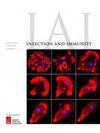控制念珠菌:肠道共生真菌的免疫调节。
IF 2.9
3区 医学
Q3 IMMUNOLOGY
引用次数: 0
摘要
肠道微生物群藏着真菌,这些真菌作为机会性病原体和炎症的驱动因素,对人类健康构成重大威胁。炎症和自身免疫性疾病与真菌群落失调和潜在致病真菌的扩张有关。肠道也是传播性真菌感染的主要贮藏地。免疫相互作用对于防止共生真菌成为致病真菌至关重要。在确定调节肠道真菌的先天性免疫途径和适应性免疫途径方面取得了重大进展,这些发现与我们对真菌分子途径和参与肠道内共生菌定植和致病过程的效应器的理解的进步相吻合。在这篇综述中,我们将讨论对调控共生真菌非常重要的免疫相互作用,重点是特定细胞类型和效应器如何与真菌相互作用以限制其定植或致病潜能。这将包括先天性和适应性免疫途径如何以真菌为目标并协调抗真菌免疫反应,以及分泌型免疫效应物(如粘液和抗菌肽)如何调节真菌定植并抑制致病潜能。这些免疫相互作用将围绕我们目前对真菌效应因子和调节该生态位内定植和致病机理的途径的理解而展开。最后,我们将强调免疫系统调节肠道共生真菌的重要机制。本文章由计算机程序翻译,如有差异,请以英文原文为准。
Controlling Candida: immune regulation of commensal fungi in the gut.
The intestinal microbiome harbors fungi that pose a significant risk to human health as opportunistic pathogens and drivers of inflammation. Inflammatory and autoimmune diseases are associated with dysbiotic fungal communities and the expansion of potentially pathogenic fungi. The gut is also the main reservoir for disseminated fungal infections. Immune interactions are critical for preventing commensal fungi from becoming pathogenic. Significant strides have been made in defining innate and adaptive immune pathways that regulate intestinal fungi, and these discoveries have coincided with advancements in our understanding of the fungal molecular pathways and effectors involved in both commensal colonization and pathogenesis within the gut. In this review, we will discuss immune interactions important for regulating commensal fungi, with a focus on how specific cell types and effectors interact with fungi to limit their colonization or pathogenic potential. This will include how innate and adaptive immune pathways target fungi and orchestrate antifungal immune responses, in addition to how secreted immune effectors, such as mucus and antimicrobial peptides, regulate fungal colonization and inhibit pathogenic potential. These immune interactions will be framed around our current understanding of the fungal effectors and pathways regulating colonization and pathogenesis within this niche. Finally, we highlight important unexplored mechanisms by which the immune system regulates commensal fungi in the gut.
求助全文
通过发布文献求助,成功后即可免费获取论文全文。
去求助
来源期刊

Infection and Immunity
医学-传染病学
CiteScore
6.00
自引率
6.50%
发文量
268
审稿时长
3 months
期刊介绍:
Infection and Immunity (IAI) provides new insights into the interactions between bacterial, fungal and parasitic pathogens and their hosts. Specific areas of interest include mechanisms of molecular pathogenesis, virulence factors, cellular microbiology, experimental models of infection, host resistance or susceptibility, and the generation of innate and adaptive immune responses. IAI also welcomes studies of the microbiome relating to host-pathogen interactions.
 求助内容:
求助内容: 应助结果提醒方式:
应助结果提醒方式:


